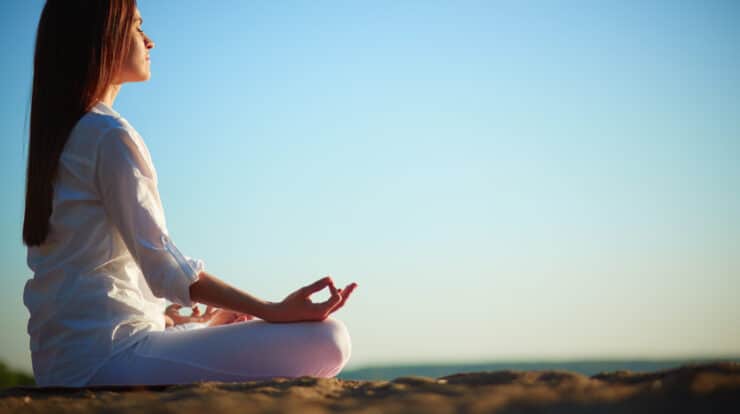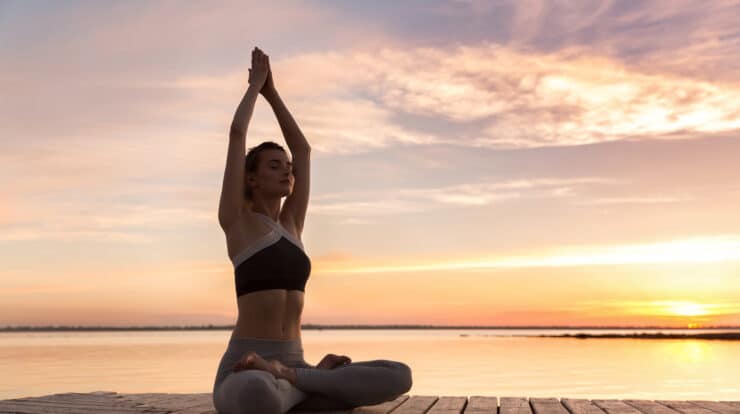Mindfulness has been around for centuries but its only recently that it gained popularity as a way to reduce stress and improve mental health. In this blog post we will explore what mindful living entails, the benefits of practicing mindfulness, how one can start their own routine, common misconceptions about mindfulness practice and finally our conclusion on this topic.
Mindful Living – An Introduction
Mindful living entails being fully present in the moment without judgment or distraction. This means paying attention to even small details that may otherwise go unnoticed while also acknowledging ones own thoughts and emotions. Cultivating this practice can help create a sense of inner peace despite external chaos or stressors. By adopting mindfulness as part of daily life individuals are better equipped to navigate through challenges with greater ease and clarity.
Mindfulness – The Benefits of Practicing
Regularly practicing mindfulness offers numerous advantages. A few of these include:
Mindfulness meditation has been found to lower cortisol levels in the body which can help alleviate stress and anxiety. By reducing these negative emotions through this practice individuals may experience a more relaxed state of being. This is an effective way for anyone looking for ways to manage their mental health effectively.
Mindfulness practices have been shown to positively impact mental health by reducing symptoms of depression and other mood disorders while also improving cognitive functioning. Furthermore these techniques can enhance memory retention capabilities.
Mindfulness practice has been linked to various health benefits such as improved immune system function, enhanced sleep quality and chronic pain management. By incorporating this technique into your daily routine you could potentially experience these positive outcomes for yourself! Its worth considering if you’re looking for ways to improve overall wellbeing without relying solely on medication or other treatments alone.
Mindfulness practice offers an opportunity for enhanced self awareness. Through this process you can gain deeper insight into your own thought patterns and behaviors allowing greater control over decision making and living a more intentional life. By taking advantage of this chance to improve yourself through mindfulness practices like meditation or yoga anyone can achieve their full potential in all aspects of life.
Beginning a Mindfulness Routine
Incorporating mindfulness into your daily routine can be a straightforward process. Follow these simple steps to get started:
Making time for meditation is crucial if you want to experience its benefits. Aiming for a daily practice of just 5-10 minutes can help kickstart your journey towards mindfulness and relaxation. Find yourself an ideal spot where distractions are minimal – this could be in the comforts of your own home or outdoors surrounded by nature – then sit down with closed eyes and breathe deeply until you feel calm. With consistent effort over time, these brief moments will become increasingly valuable as they allow us space from our busy lives and provide opportunities for reflection and self care.
To cultivate mindfulness and reduce stress it is essential to prioritize focusing on your breath. This practice involves noticing the sensation of air moving in and out of your body while acknowledging any distracting thoughts without judgment or attachment. By doing so consistently over time you’ll develop greater awareness and resilience against mental turmoil. So why wait? Start practicing today!
Incorporating a calming phrase or word into your practice can help you achieve inner peace and tranquility. Consider repeating “peace” or “calm” during meditation for optimal results. This technique is known to be effective in reducing stress levels while promoting relaxation. So why not give it a try? You have nothing to lose but everything to gain!
Mindfulness – Common Misunderstandings
Despite its growing popularity, there are still several misconceptions about mindfulness practice. Here are some examples:
Mindfulness has its roots in Buddhist teachings but it is not exclusively a religious practice. Its principles can be applied by anyone regardless of their spiritual beliefs or lack thereof. This makes mindfulness an inclusive and accessible tool for personal growth and development.
The belief that mindfulness necessitates sitting still for hours is a misconception. Consistent practice, no matter how brief each session may be, can yield positive results. The key lies in consistency rather than duration. So don’t let fear of committing to long periods deter you from trying out this beneficial technique!
Mindfulness is often associated with suppressing thoughts – however this isn’t the case. Instead it encourages acknowledging and observing one’s thoughts without judgment or attachment. This allows for greater self awareness and acceptance of ones own mental processes.
Final Thoughts and Conclusion
Mindfulness is a potent means of enhancing physical, mental and emotional well being. Whether you’re new to mindfulness or an experienced practitioner incorporating it into your daily routine can help bring balance and clarity amidst the chaos in our lives today. So take some time out for yourself – breathe deeply; slow down and try giving mindfulness a shot! We believe that once you do so-you won’t regret it one bit!




